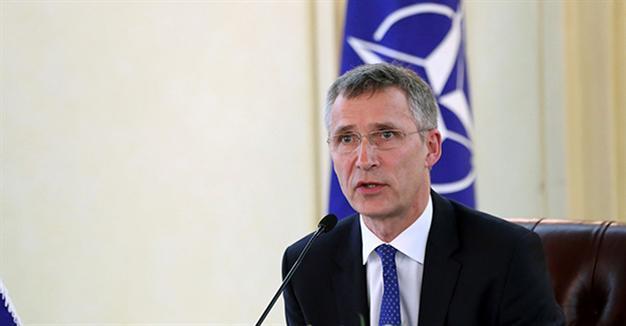NATO’s Stoltenberg welcomes expansion of NATO deployment in Aegean Sea
BRUSSELS

NATO Secretary General Jens Stoltenberg (L) speaks to the press after signing a NATO-Kuwait transit agreement with the Kuwaiti Foreign Minister at the foreign ministry in Kuwait City on February 29, 2016. AFP Photo
NATO Secretary-General Jens Stoltenberg has said he welcomes NATO’s swift decisions to deploy ships to the Aegean Sea to support two of its members, Greece and Turkey, as well as the EU’s border agency Frontex, in their efforts to tackle the migrant and refugee crisis.“NATO ships are already collecting information and conducting monitoring in the Aegean Sea. Their activity will now be expanded to take place also in territorial waters,” said Stoltenberg in a statement released on the alliance’s website on March 6.
The NATO mission to slow the migrant influx to the European Union via the Aegean Sea and monitor smugglers was first announced by Turkish Prime Minister Ahmet Davutoğlu and German Chancellor Angela Merkel on Feb. 8 in Ankara. In the following days, the plan was accepted by the NATO foreign ministers.
NATO chief said the alliance’s commanders had defined NATO’s area of activity in close consultation and coordination with both Greece and Turkey, and that NATO “activities in territorial waters will be carried out in consultation and coordination with both Allies.”
“The purpose of NATO’s deployment is not to stop or push back migrant boats, but to help our allies Greece and Turkey, as well as the European Union, in their efforts to tackle human trafficking and the criminal networks that are fueling this crisis,” the statement followed.
More than 1 million migrants have flocked to the EU in 2015 alone and this figure has exceeded 135,000 people in the first two months of 2016, while more than 400 people have died making the perilous journey.
NATO’s Maritime Command also agreed with Frontex on arrangements at the operational and tactical level, while NATO and Frontex will be able to exchange liaison officers and share information in real time, to enable Frontex, as well as Greece and Turkey, to take action in real time, Stoltenberg said.
“This is an excellent example of how NATO and the EU can work together to address common challenges. I welcome the fact that we were able to finalize these arrangements in such a short time,” he said. “In this crisis, time is of the essence, and cooperation is key.”
















